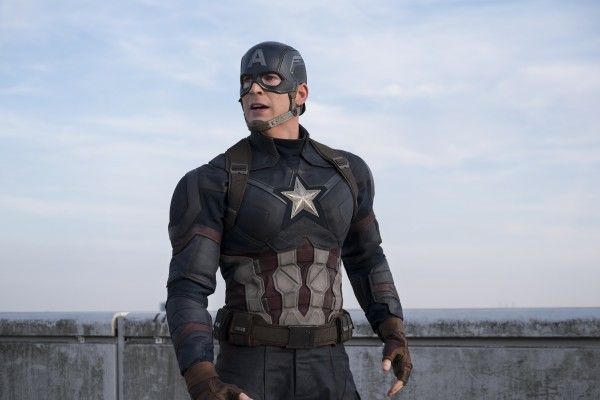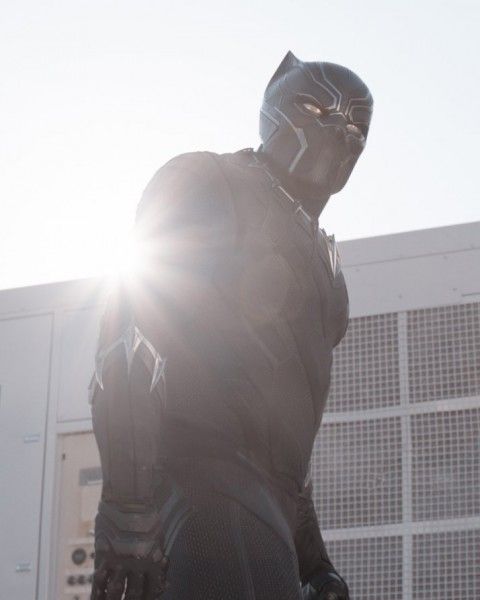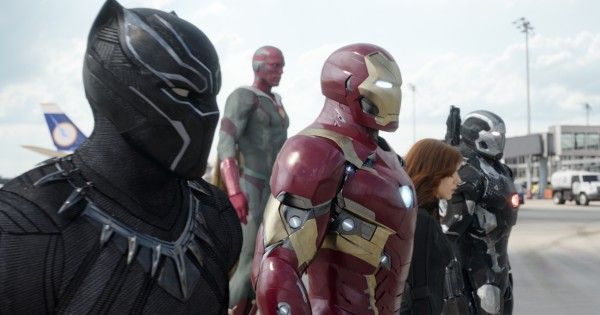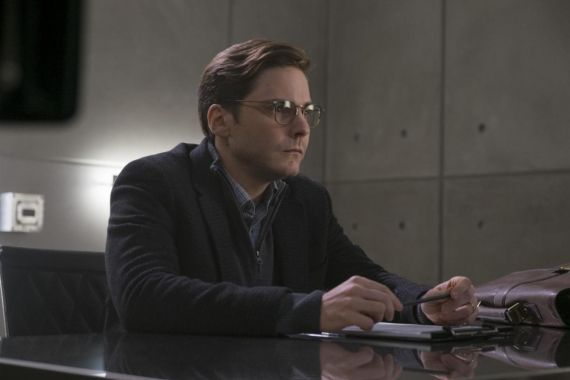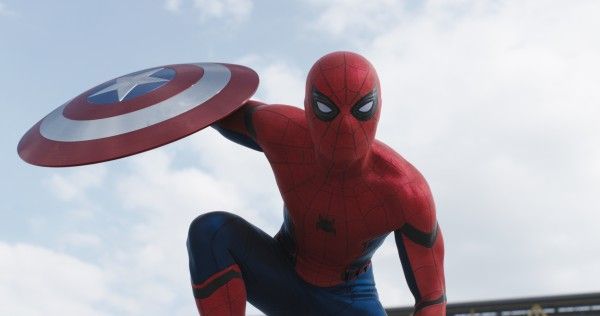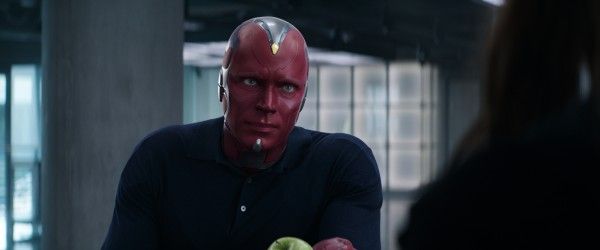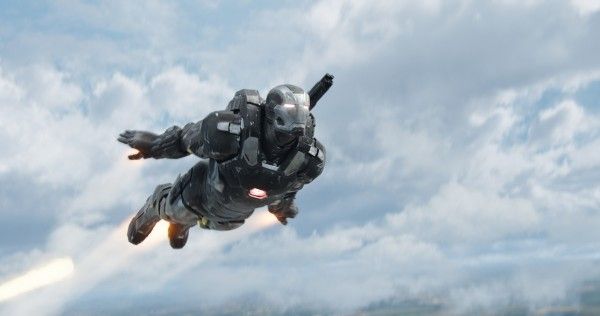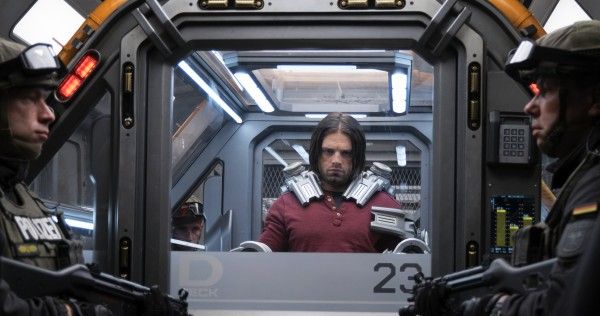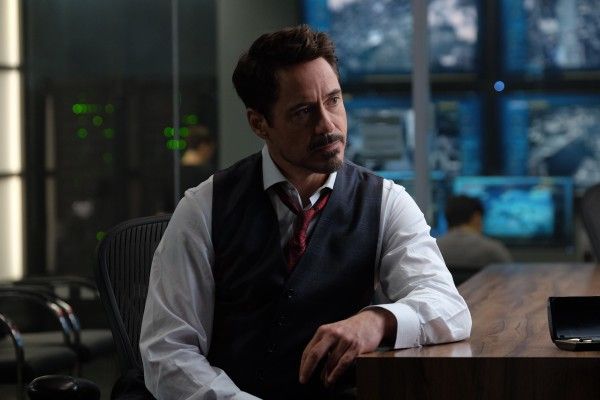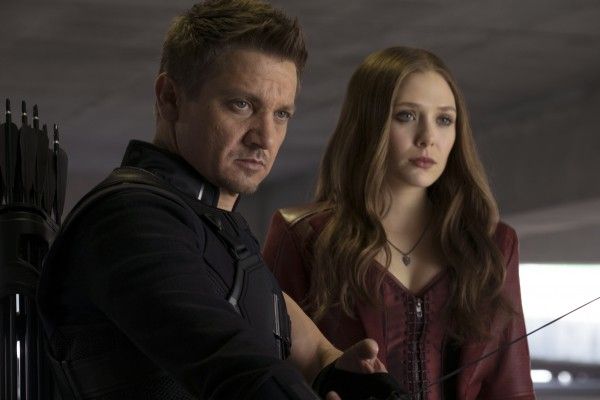With Captain America: Civil War opening in theaters this weekend, I spoke today with British composer Henry Jackman about the cool score he created for Marvel’s highly anticipated third film in the franchise directed by Anthony & Joe Russo and starring Chris Evans, Robert Downey, Jr. and Scarlett Johansson. Jackman previously composed the thrilling score for the studio’s Captain America: The Winter Soldier. In this latest installment of the comic book adaptation, saving the world becomes even more dangerous when the Avengers fracture and fight among themselves after the government accuses the superheroes of vigilantism and political pressure mounts to oversee their activities.
In an exclusive interview with Collider, Jackman talked about his latest collaboration with the Russo Brothers, his creative process, why Civil War is tonally so different from The Winter Soldier, the distinct music he crafted to capture the film’s major themes and its newest characters: Spider-Man (Tom Holland), Black Panther (Chadwick Boseman) and Zemo (Daniel Brühl), how he used more symphonic and orchestral music and less electronic this time around, what it was like recording at London’s AIR Studio, his most memorable moments working on the film, his upcoming movies Birth of a Nation and Jack Reacher: Never Go Back, and the best advice he ever got from Hans Zimmer about being a film composer.
Check it all out in the interview below. Be aware there may be a few spoilers:
This is your second collaboration with the Russo Brothers. How was the creative process this time around in terms of crafting the sound and helping them realize their vision?
HENRY JACKMAN: That’s a really good question. It’s something a bit like fitting into clothes you already know. If you’ve worked with people before, you have that great benefit of joining in a team that’s already been a bit on a mission and hopefully succeeded. So, that part of it is a known quantity, and you’re not feeling each other out for the first time as it were. But, funnily enough, this movie tonally was so different to the second one, especially what I did with the music. It’s a lot more symphonic and orchestral. In a way, even though you’re joining the same people, you’re going on a completely different trip. It’s sort of a combination of the known and the unknown. The unknown was it took a little while to find the tone for this movie, which I was very happy about, because it’s really different. The movie has so many characters in it. It’s sort of half Captain America, half an Avengers film in a way, and the tone of it is different. By the time you get to the fight at the airport, with superhero versus superhero, it’s just a slightly different approach than in the second Cap film. It meant that I got to use more symphonic and orchestral music and less electronic than the second one. So, it’s a bit of both. You may be joining the same team and you all know each other, but you’re still marching out into the unknown to find what the right thing is for the next film.
Did you have initial discussions and then you worked in a solitary manner or did you collaborate closely with them throughout?
JACKMAN: It’s sort of the first. What happens, especially once you have a working relationship and people trust you, yeah, you have discussions. You watch the movie. I’ll pitch them some ideas. Then what happens is I say, “Let me just go away and start writing.” There’s only so much you can talk about it. Then, I’ll go and start writing. I’ll write some themes. I’ll write a Spider-Man theme and a Captain America theme for this particular movie. Let me just get going and then meet up again and collaborate and show what I’ve written and what’s working and what isn’t working. It’s a mixture of both. What would tend to happen is I would write non-stop for a week, and then every week we’d meet up and play through the music. The great thing about the Russo Brothers is they have just the right balance of not being so interfering that it’s micromanagement, but giving just the right guidance and filmmaking pointers for various scenes and various pieces without every going, “Oh, this is what the viola should be doing,” or “Why don’t you use these notes?,” or anything like that, which is great. It’s the perfect combination of just enough involvement but not in a musical micro-managerial veto.
How long did you work on the score? Did you have months to work on this or was it a fairly short schedule?
JACKMAN: No, it was months. If you added it up, it might have been four or five months, I think. Something like that. I’d read the script ages before because that existed. Then, I saw the movie maybe five or six months before the movie came out. Especially with a big film like that, it’s about 115 minutes of score, and there’s a lot of characters and a lot of musical challenges to figure out. So, you need about that much.
This is Marvel’s third film in the franchise. Did Marvel give notes or make any suggestions in terms of the music?
JACKMAN: Not really. No. Kevin Feige has a really good judgment for picking people he wants to do the job and do it the way he wants it done. And then, the fact that he picked Joe and Anthony Russo, when he first selected them to do Captain America 2, I thought was quite a bold move. It’s not like they’d done millions of films. Once he’s confident that they really are on top of what’s supposed to be happening, which they absolutely were, he really trusts them. The whole process of getting the score done is not just Kevin. Kevin, the head of the studio, would listen to stuff, but as long as he’s not hearing anything that he doesn’t think is right, he’s very happy to let his directors execute the vision. There wasn’t too much. That’s not to say if things were going horribly wrong, I’m sure he’d have something to say, but he’s got the wisdom to know if things are working, let it progress. If things aren’t working, step in and do something about it.
How did you go about creating distinct music that captures the film’s major themes but is also unique to the characters and reveals their depth and complexity?
JACKMAN: I have no idea. (Laughs) Basically, the first stage is when you read the script. I find scripts very helpful. You think it’s a bit counterintuitive, because until you’re really seeing something brought to life, how would you get inspired? But actually, when you read a script, and if it’s a good one, you’re beginning to get the secret structural information on what’s important and what themes are important. It’s a 200-page long thing and it has all these details, but as you read it, you’re starting to go, “Okay, fine.” There are all these different things, but what’s the most important thing? Obviously, Captain America, then the Civil War. What are the themes that are important? Okay, Spider-Man is showing up. Black Panther is showing up. You start to get these sort of structural indicators of what’s going to be important in the music. Now that doesn’t equate yet to having written music, but you’re starting to figure out why you’re writing this and what it’s for. I don’t even know quite how it works really. I just start watching it, and I start writing and try and find something that both thematically and tonally suits that character or that idea.
What instruments did you use in your score and how did the choice of instruments vary depending on the themes and the context of a scene?
JACKMAN: Sometimes you’ll make a very self-conscious choice, and like I said, this movie was more orchestral. Basically, coming out the gates, it’s the symphonic Western orchestra as we understand it – an enormous great string section, triple woodwinds, full brass section. I actually used a bit of choir. So, that’s the full symphony orchestra at your disposal as a composer. Obviously, in heroic writing, brass is going to take a real front seat in that. Then, you get into the extra colors that you can think about that could potentially help characterization.
With Zemo, for instance, I used a lot of these rather unusual tuned bells. We filled the whole of our studios one day with every known manufacturer of obscure tuned percussion and also a cimbalom, because I wanted a slightly otherly sound, and also the cimbalom with roots a little bit in a feeling of East Europe. Some of the names of these bells that we had I’d never even heard of. I sent the musician some of the files because immediately I was writing, and I said to him, “Do me a favor. Just so we get inspired, bring every conceivable type of tuned bell you’ve ever heard of. He took this quite literally, because when we got there, it was an entire room, like a sort of laboratory, with instruments I’d never seen nor heard of, and they were fascinating. We used those for Zemo along with the cimbalom.
For Black Panther, to get a slightly extra color, I actually used a combination funnily enough of these African woodwinds for when he’s talking about his ancestors. Also, muted orchestral trombones were very useful for Black Panther because it brought his character into the grandeur of the symphony orchestra, but there’s a slightly vengeful, serrated sound to muted trombones if you pick the right kind of mood. That was very handy. So yeah, you can tinker. If you use certain colors outside of the Western symphony orchestra, it can be very handy. There are a few electronic textures, not too many, but there are just a few subtle electronic textures around the place to help out.
How do you balance creating music for the large action sequences in this film with the more intimate moments between the characters?
JACKMAN: Oh it’s great. I don’t think it’s really that challenging, because if you had to spend four months writing 115 minutes of intimate music, you’d be chomping at the bit to do something on a grand scale and with more kineticism to it. Conversely, if you had to write 115 minutes of non-stop kinetic thematic action music, you’d be praying for a bit of space so that you could write something else. So, it sort of balances itself out. It’s like anything else in life really. If you’ve got 115 minutes of music, it’s only natural that there should be quite a wide variation, especially in a movie like this where there are many different things going on. Not only are there many different characters, but you’ve sort of got a thriller beat to the film. You’ve got the Zemo character. You’ve got the overall concept of the Civil War. You’ve got comedy. There’s so much going on that it only makes sense that there are many types of musical psychology within the score.
What was it like recording the score at London’s AIR Lyndhurst Studio?
JACKMAN: It was great. I actually love that room. The main room at AIR has been around I don’t know how long to say. Someone would have to look it up, but it has a certain historical grandeur to it just being there, and the players are absolutely fantastic. I think we were there for six days, and I was driving them crazy just constantly pushing for an ever better performance. By any standards, they had already played it absolutely amazingly and I’d just be going, “Just let’s try one more for this one little reason.” You’d raise their salary, but you’d already paid them amazingly less. They really didn’t mind. They just kept at it. If they heard me say that, they’d probably hate me. (Laughs) It’s a combination of being brilliant musicians, but also they were enormously committed to the project. And the combination of the two things, you get incredible results.
Is there a day or two you’ll always remember from working on Captain America: Civil War?
JACKMAN: I think two things really stick out. One is the first evening we were doing this tuned percussion for the Zemo character. I’d popped out for dinner and arrived at the studio where formerly the symphony orchestra had been sitting there to be confronted by an entire army of all sorts of exotic instruments that looked like a Dr. Seuss or a Terry Gilliam film with all these bizarre, weird instruments I’d never seen in my life. It was amazing and very educational.
The other thing I’ll probably remember that stands out is right towards the end of the film. In the final battle between Captain America, Winter Soldier and Iron Man, the tone changes and becomes somewhat operatic and it’s almost classical in its style. I knew I sort of wanted to do that with the score, but I was a little nervous as to whether it was a good idea, because some of the harmony and the orchestration really does get quite classical. Just before writing it, I was ringing the picture editor to say, “Wow, I got this idea and I don’t know if I should go for it.” I was procrastinating on writing that last sequence because it was like stepping into the water on a cold day. Then, as soon as I put my foot in and started writing it, I just launched in and I was very happy with that last battle at the end and the music. That Act 3 of the movie I was very, very happy with, but I was chewing my fingernails before writing it because I wasn’t quite sure whether I’d be allowed to go for it.
Can you talk about your upcoming projects: Birth of a Nation which premiered at Sundance earlier this year and Jack Reacher: Never Go Back which is in post? Have you seen the finished films and what are your thoughts?
JACKMAN: Yes, they’re both great films and hugely different. Birth of a Nation we already know there’s a huge amount of excitement and interest in it. Nate Parker wrote, starred and directed it, which can potentially sound like one of those awful vanity projects. But, I can’t think of anyone who’s done such an incredible job at making a beautiful and an important film, and in an understated way, and against the odds, and with a subject matter that’s controversial and thought provoking. He’s an incredibly inspiring personality who singlehandedly took a project that many people didn’t believe could get financed or could get released. He certainly didn’t have any of the usual resources that people could expect to have in making a movie that ended up as good as his. He overcame every single obstacle, and I was just very proud to be able to be part of that process. When we started, we kind of looked at each other and said, “Well, let’s not worry about budget right now, because at the moment we have nothing. So, we’ll worry about it later and we’ll make something happen.” And somehow it did happen. We ended up with a score with gospel choir, solo cello, children’s choir, two solo singers, a symphony orchestra. It’s one of the scores I’m most proud of.
And the Jack Reacher film that I’m just involved in now is a very interesting one. It’s amazing to work on a movie with Tom Cruise. I mean, we all know what he’s capable of doing. What’s interesting about this film is we all know that he’s been a superstar in so many successful action films. It’s got all of that in the Jack Reacher film, but it’s also got a really strong dramatic and emotional performance. Because he’s been so successful with action films, some people might have forgotten the Tom Cruise of Jerry Maguire and Magnolia. He’s actually a dramatic actor of a serious nature and there’s that actually in the film as well. So, it’s a really interesting combination of the sort of things you’d expect in an espionage-type thriller and an action-based film, but it also has this really strong dramatic performance which I personally think makes it way deeper and a much more enjoyable experience.
What’s the best advice you ever got about being a composer?
JACKMAN: Being a film composer, the best advice I ever got was probably from Hans Zimmer who said, “It’s all very well writing music, and it’s all very well being good at writing music, but the real secret is you’ve got to know why you’re writing it and what it’s for.”
Captain America: Civil War is in theaters now.

